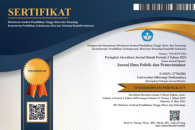Rekrutmen Politik Calon Kepala Daerah (Studi Tentang Seleksi Kandidat di Partai Keadilan Sejahtera Dalam Pemilukada Kota Tasikmalaya Tahun 2017)
Abstract
Recruitment of regional head candidates is part of the political process in the internal party in dealing with the General Election. Candidate selection is a "secret garden" for each party, besides the selection process is sometimes easily influenced by other forces outside political parties. Likewise, what happened in the selection process of candidates for regional head candidates in the DPD PKS at the Regional Election in Tasikmalaya City in 2017. This study was to answer the research question "What is the selection method in political recruitment of regional head candidates by the Prosperous Justice Party at the Regional Election in Tasikmalaya City 2017, What factors influence changes in the decision making of prospective regional heads by PKS ". This study aims to describe, analyze the selection of candidates, and explain the factors that influence the decision making of prospective regional head candidates from PKS. The results of this study explain the selection of PKS determined by party elites. At the local level the selection looks democratic while at the level of the DPW and DPP is strongly influenced by the party elite with a closed selection model. in general the candidate selection process at PKS shows non-democratic degrees.
Keywords
Full Text:
PDF (Bahasa Indonesia)References
Bahkti, Ikrar Nusa dan Haris, Syamsuddin, Dkk. (2016). Panduan Rekrutmen & Kaderisasi Partai Politik Ideal di Indonesia, Jakarta: Direktorat Pendidikan dan dan Pelayanan Masyarakat Kedeputian Pencegahan, Komisi Pemberantasan Korupsi dan LIPI.
Best, Heinrich and Cotta, Maurizio. (2000). ‘ Elite transformation and modes of representtaion since the mid-nineteenth century: Some theoretical considerations’, in Best, Heinrich and Cotta, Maurizio (eds), parliamentary Representatives in Europe 1848-2000, Oxford university press.
Firmanzah. (2011). Mengelola Partai Politik, Komunikasi dan Positioning Idiologi Politik di Era Demokrasi, Jakarta: Yayasan Obor Indonesia.
Galagher, Michael and Michael Marsh (eds). (1988). “Candidate Selection in Comparative perspective: The Secret garden Of Politics, London: Sage.
Hands, Gordon , Robert Michels and The Study of Political Parties. (1998). dalam British Journal of Political Science, Vol. 1, No. 5.
Hazan, Reuven, Y and Pennings, Paul (Eds). (2001). “ Democratizing Candidate Selection: Causes and consequencesâ€, special Issue of Party Politics Reuven Hazan,Y and Pennings, Paul (Eds). (2001). “ Democratizing Candidate Selection: Causes and consequencesâ€, special Issue of Party Politics.
Held, David (2006). Models of Democracy, Akbar Tanjung Institute, Jakarta.
John W Creswell & Pianno Clark. 2007. Designing and conducting mixed methods research. Thousand Oaks: Sage.
Lidle, William,. (1970). Ethnicity, Party and National Integrations: An Indonesian Case Study, New Haven: Yale University Press.
Mainwaring, Scott dan Scully, Timothy R. (1995). Building Democratic Institutions: Party System in Latin America, Standford: Standford University Press.
Michels, Robert. (1984). Partai Politik, Kecenderungan Oligarkis dalam Birokrasi, Rajawali, Jakarta.
Moisei, Ostrogorski. (1991). Democracy and the organisation of political Parties, (London: Macmillan,) lihat juga, Firman Noor, 2015, Perpecahan dan Soliditas Partai Islam di Indonesia: Kasus PKB dan PKS di dekade Awal Reformasi, Jakarta: LIPI.
Muhtadi, Burhanudin. (2019). Populisme Politik Identitas dan Dinamika Elektoral, Mengurai Jalan Panjang Demokrasi Prosedural. Malang: Intrans Publishing.
Norris, Pippa. (2006). “Recruitment, dalam Richard S Katz & William Crotty, HandBook of Party Politics, London : Sage.
Pamungkas, Sigit. (2011). Partai Politik. Yogyakarta: Institute for Democracy and Welfarism.
Rahat, Gideon, “What Is Democratic Candidate Selection?†dalam William P. Cross dan Richard S. Katz (eds.), Op.cit.
Randall, Vickey. (1998). Political Parties in the Third World, London : Sage.
Rauf, Maswardi. (2006). Format Kepartaian dan Sistem Pemilu Masa depan, Jurnal politik Volume 2 . Akbar Tanjung Institute No 2 Th 2006.
Sachsenroder, Wolfgang dan Fring, Ulrike E. (eds). (1998). Political Party Systems and Democratic Development in East and Southeast Asia: Volume I Southeast Asia, Aldorshot: Ashgate Publishing Limited.
Scarrow, Susan E. (2006). “ The Nineteenth-Century Origins of Modern Political Parties: The Unwanted Emergence Of Party–Based Politicsâ€, dalam Richard S. Katz dan William Crotty, Handbook of Party Politics, London: SAGE Publication.
Stefen, Wolinetz. (2004) Party Systems and Party System Type dalam Richard S Katz dan william Crotty (terj), handbook of Party Politics, London: Sage Publications.
Subekti, Valina Singka. (2015). Dinamika Konsolidasi Demokrasi, Dari Ide Pembaruan Sistem Politik hingga ke Praktik Pemerintahan Demokratis. Jakarta: Obor.
Sugiyono. (2013). Metode Penelitian Kombinasi (Mixed Methods).
Taylor, S.J., Bogdan, R., & De Vault, M.L (2016). Introduction to Qualitative Research Methods: A Guidebook and Resource (4th Ed). New Jersey: John Wiley & Sons, Inc.
Yin (2009) dalam Creswell. (2014). Penelitian Kualitatif dan Desain Riset, memilih Di Antara Lima pendekatan. Yogyakarta: Pustaka Pelajar
DOI: https://doi.org/10.37058/jipp.v6i1.1984
Refbacks
- There are currently no refbacks.
Copyright (c) 2020 Teguh Anggoro; Tina Cahya Mulyatin; Triono;
View My Stats











